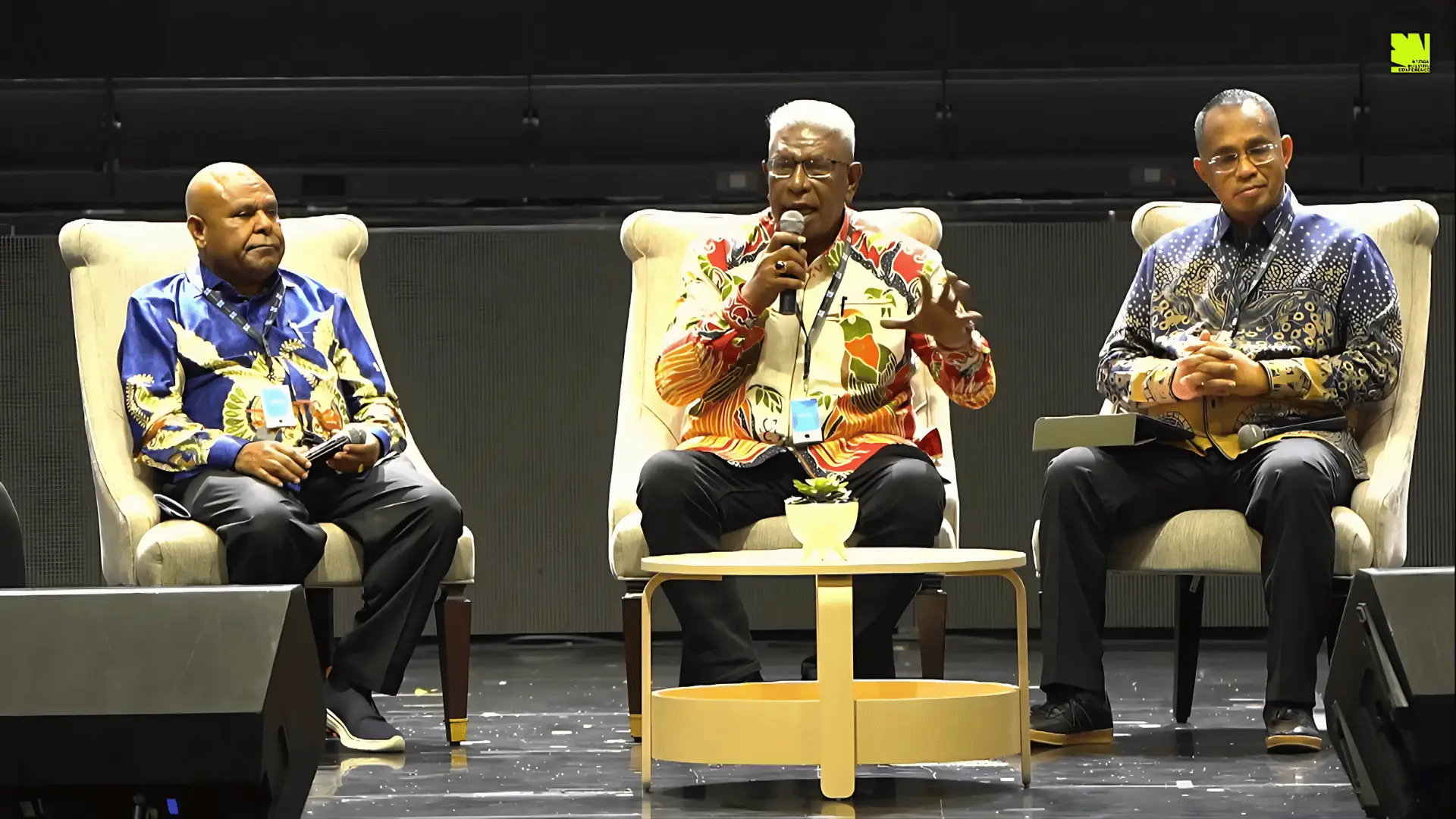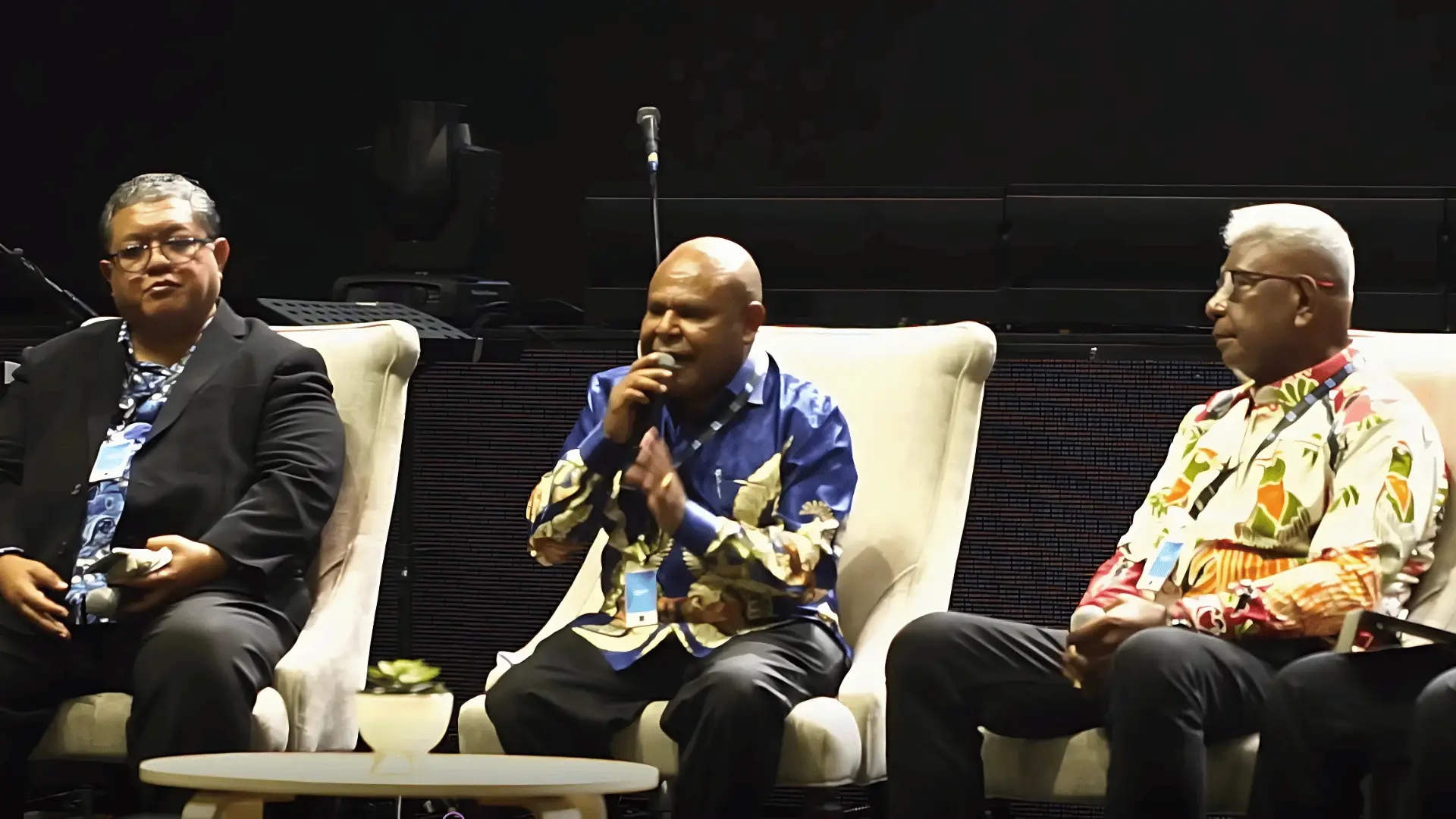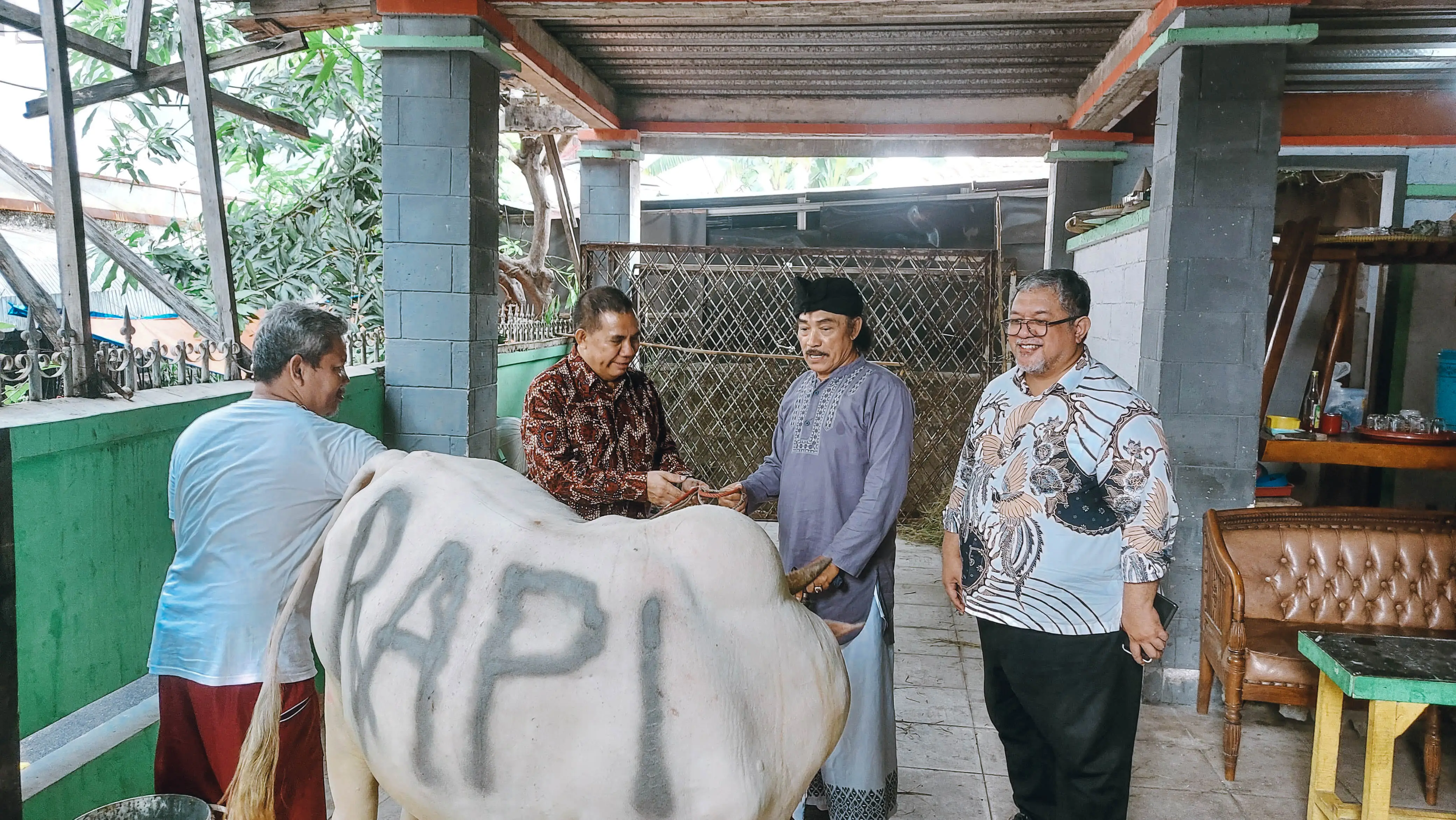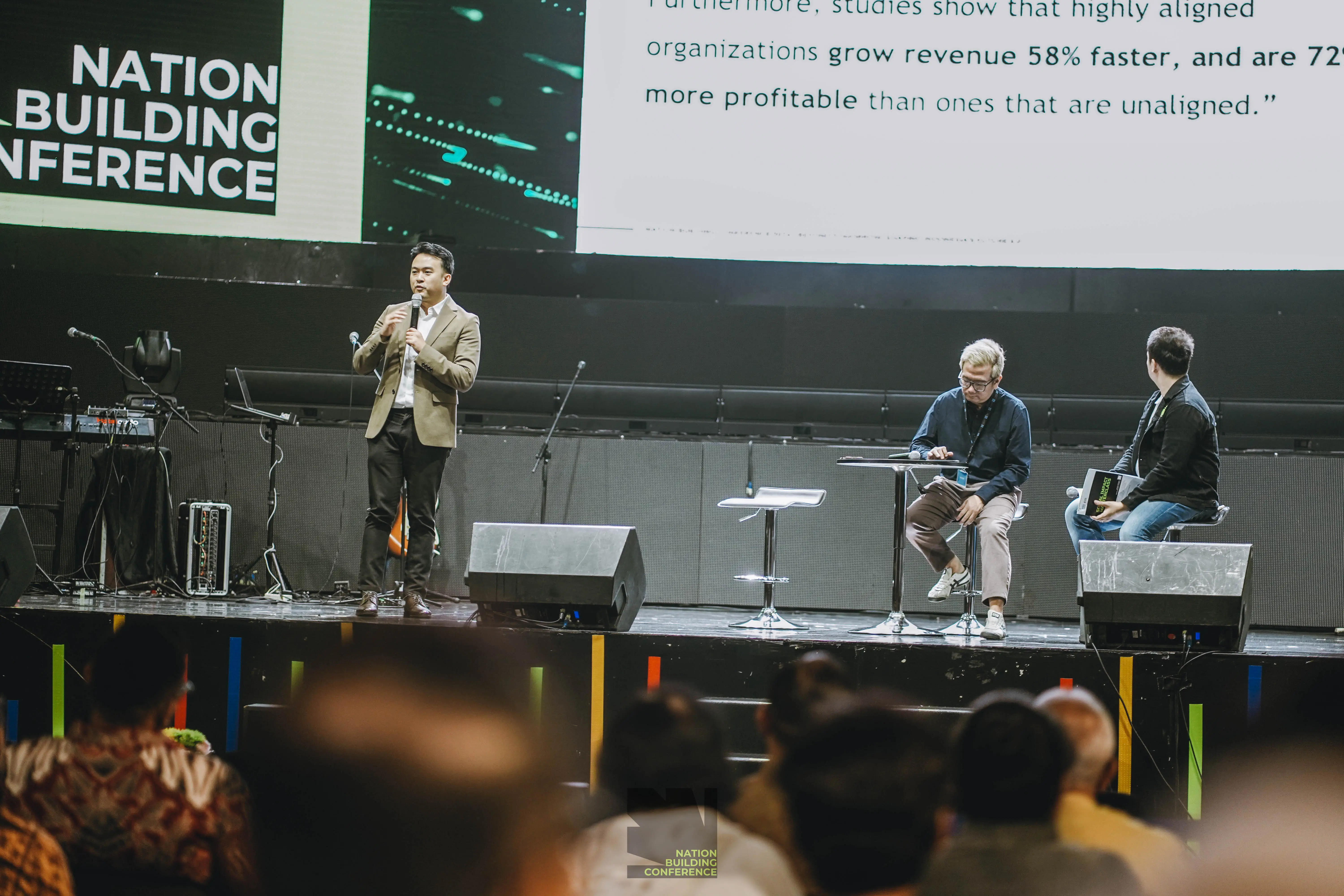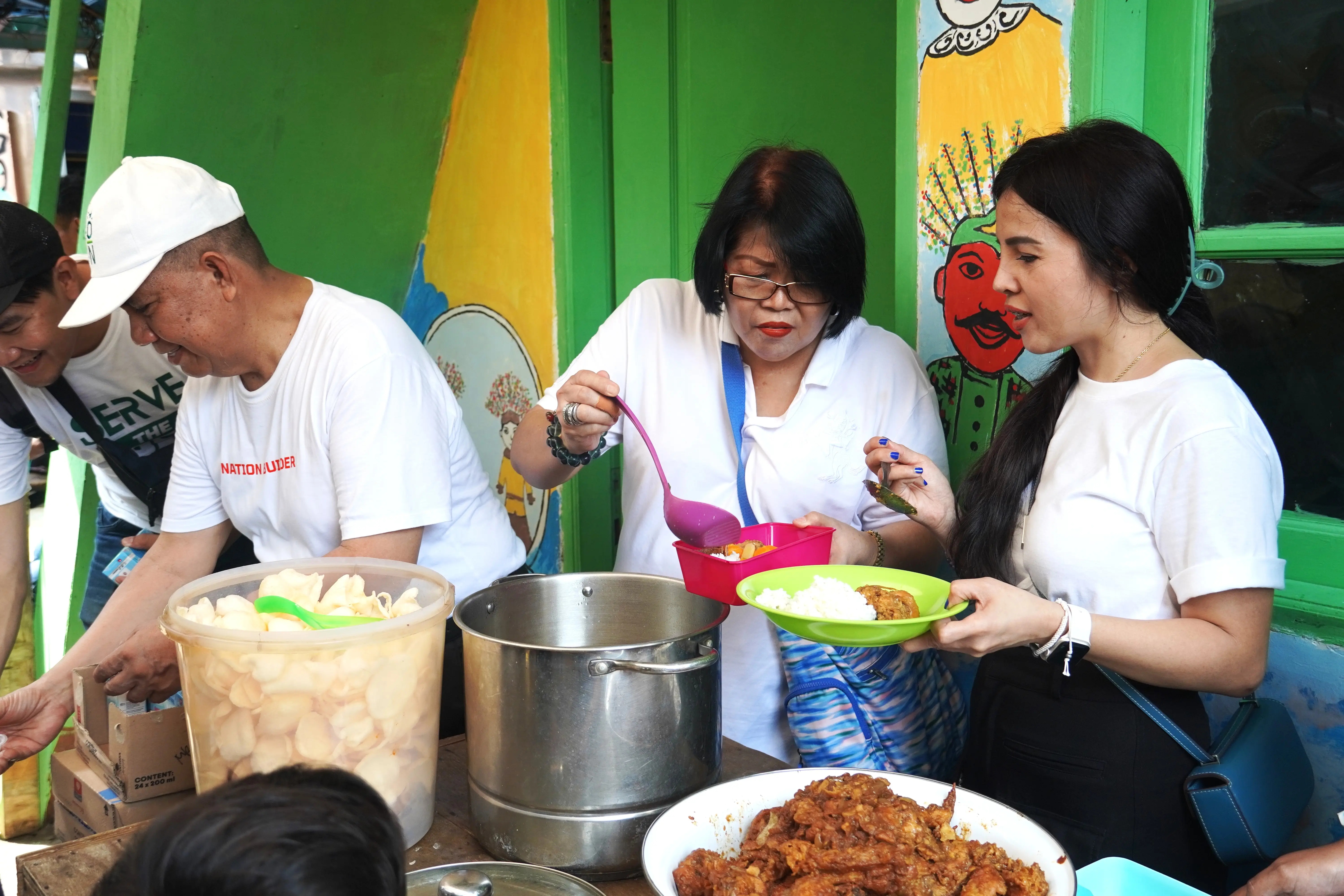In the series of “Talkshow of The East” at the Nation Building Conference 2024, Johannes Rettob—who will soon serve as Mimika Regent for the 2025–2030 period—delivered a speech full of vision and hope. Taking place at a forum held by Indonesian Leader Volunteers & One Story for Indonesia, he emphasized the importance of exploring the abundant natural potential and unraveling regulatory obstacles for the progress of the Mimika community. Here is the gist of his speech:
“I happened to be in Mimika, and Mimika is a district located in Central Papua Province at this time. On the south coast, our region is very large—consisting of forests, mountains, and beautiful beaches—with extraordinary natural potential. Here lies one of the highest mountains in the world, including part of the Seven Summits, namely Mount Cartens. Beaches with extraordinary white sand, as well as very large mangrove forests have been designated as protected areas. In fact, there is Lawrence Park which is part of the management of the mangrove area. All of this shows that Mimika has very large natural tourism potential.”
Johannes added that all development in Mimika is often hampered by protected forest regulations:
"Because many of our areas are designated as protected forests, every development must go through long procedures and regulations from the Ministry in Jakarta. This makes the realization of projects in Mimika slow because much of the bureaucracy is centered on Java Island."
Furthermore, in his speech he highlighted the existence of PT Freeport Indonesia:
“PT Freeport Indonesia may be familiar to us—the world’s largest mining company operating here, with a gold mine that generates significant economic contributions. However, we also have a sea, known on the map as the Sea of 758, where the fish potential is very large. Currently, we have only processed around 0.025% of the sea’s potential. This means that the fisheries sector has a very large space to be developed.”
Johannes Rettob's Keynote Key Points
- Huge Natural Potential
- Mimika has Mount Cartens (part of the Seven Summits).
- White sandy beaches and tens of thousands of hectares of mangrove forests (Lawrence Park).
- The potential for natural tourism (mountains, beaches and mangroves) has not been utilized optimally.
- Regulatory Barriers to Protected Forests
- Many areas in Mimika are designated as protected forests → any development awaits approval from the ministry in Jakarta.
- The regulation was drafted with the assumption of conditions on Java Island, thus slowing down the acceleration of development in Papua, especially Mimika.
- The existence of PT Freeport Indonesia
- Freeport as the largest gold mine in the world brings economic contributions.
- However, the mining sector has not had an even impact on all levels of society.
- Unmanaged Fisheries Resources
- The 758 Sea holds huge fish potential; currently only 0.025% is processed.
- A great opportunity to develop the local fishing industry, improving the welfare of fishermen.
- Logistics Challenges and Local Industry
- Mimika's topography (mountains, delta, coast) makes it difficult to distribute goods; prices of basic necessities are high.
- Proposal: Centralize industrial and logistics development in Papua (especially Mimika) to make prices more affordable.
- Central Regulations Less Sensitive to Local Character
- Central government policies often do not take into account Papua's geographical and socio-economic conditions.
Policy updates are needed to be more responsive and not burden regions.
- Central government policies often do not take into account Papua's geographical and socio-economic conditions.
- Socio-Economic Conditions of Mimika Society
- The population is around 360 thousand people, with an area of 21 thousand km², spread across the coast, plains and mountains.
High poverty and unemployment rates—despite living in a “rice barn”—result in a low Human Development Index (HDI). - Access to education and health is still limited; life expectancy is relatively low.
- The population is around 360 thousand people, with an area of 21 thousand km², spread across the coast, plains and mountains.
- The Urgency of Collaboration between Regional and Central Governments
- Intensive intervention is needed to improve the welfare of the Mimika people.
- Leaders in Papua need innovation, creativity and courage to continue to drive sustainable development.
- Cooperation across regional and central governments is key, especially in formulating pro-Papuan people policies.
- Breaking Down the Negative Stigma Against Papua
- Papua is safe, peaceful, and the people are friendly; daily activities run normally without disruption.
- The media often presents the opposite narrative; Johannes invites all parties to come directly and see the real conditions for themselves.
Logistical Barriers and the Need for Local Industrialization
Regent-elect Johannes Rettob then outlined the challenges of goods distribution and transportation:
Regent-elect Johannes Rettob then outlined the challenges of goods distribution and transportation:
"The Mimika community, which numbers around 360 thousand people, with an area of 21 thousand km², is spread between the coastal plains, deltas, and mountains. This topography makes transportation very expensive, so prices in Mimika depend on distribution from Java. In the future, industries must be centered in Papua, especially in Mimika, so that prices can be more affordable and the local economy can grow."
Critical Point: Central Regulations Not Yet Sensitive to Papuan Character
In the “Talkshow of The East” session, Johannes firmly highlighted the central government regulations which were considered not to reflect the conditions in Papua:
In the “Talkshow of The East” session, Johannes firmly highlighted the central government regulations which were considered not to reflect the conditions in Papua:
"Ladies and gentlemen, regulations made by the Central Government often reflect on Java without looking at our reality in Papua. This is a big challenge in development in Mimika Regency and all of Papua, even Maluku. We need policy updates so as not to harm the region."
The People's Economic Potential is Still Ignored
Johannes Rettob did not forget to convey the socio-economic facts:
Johannes Rettob did not forget to convey the socio-economic facts:
“The potential for fisheries, livestock, agriculture, and tourism in Mimika is very large. However, to this day, the Mimika community still has a high poverty rate despite living in a ‘rice barn’. We laugh, but ‘rats die in rice barns’. Unemployment is also high. This has an impact on the Human Development Index which is still low—due to limited education and health access issues.”
He stressed the urgency of regional and central government intervention:
"The government must intervene a lot, helping the Mimika community. Leaders in Papua must be innovative, creative, and brave. We must work together with the Central Government to pay special attention to Mimika, how to guide central policies to be in line with the needs of the people here."
Closing Message: An Invitation to Get to Know Papua Better
Closing his speech, Johannes Rettob invited all Indonesian people to get rid of the negative stigma about Papua:
Closing his speech, Johannes Rettob invited all Indonesian people to get rid of the negative stigma about Papua:
“If there are movements that sound noisy, it is only the dissatisfaction of a small part. But I want to emphasize: Papua is safe, Papua is peaceful, and very beautiful. The media often shows Papua as if it is chaotic, when in fact the people are very friendly. I myself live there—we can walk 24 hours without any significant disturbance. Come, see firsthand the beauty of Mimika and the friendliness of the Papuan people.”
As the elected Regent of Mimika (2025–2030), Johannes Rettob is committed to continuing the following concrete steps: strengthening local sensitivity policies, encouraging industrial infrastructure development in Mimika, and exploring sustainable natural resource-based economic potential. His speech in the “Talkshow of The East” is a strong signal for all levels of society and government to join hands to realize a more advanced and prosperous Mimika.
This news was written by the Indonesian Leaders Volunteer Public Relations Team.

